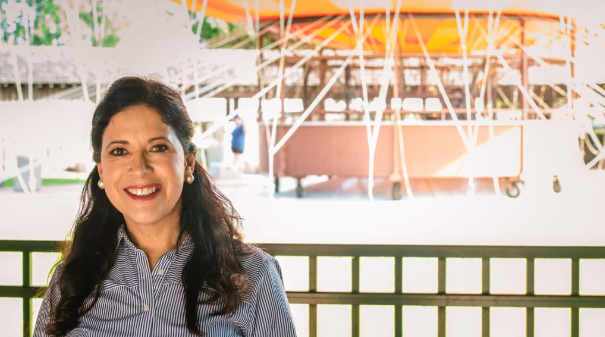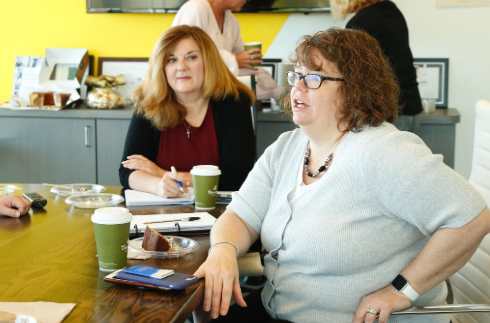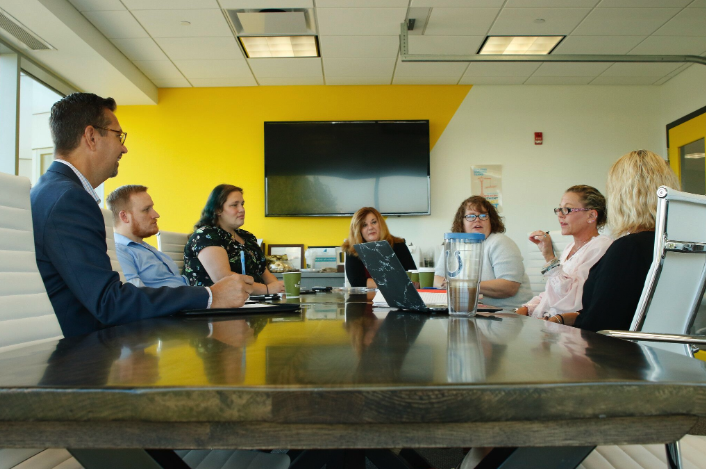Fishers Disability Inclusion in the Workplace Business Networking Group Empowers Local Businesses & Employees
Photographer / Brian Brosmer
 The City of Fishers and select businesses noticed there was one group missing from its workforce — those from the physically and mentally disabled populations. After identifying that gap and recognizing the need to fill it, a group of residents came together to form the Fishers Disability Inclusion in the Workforce Business Networking Group.
The City of Fishers and select businesses noticed there was one group missing from its workforce — those from the physically and mentally disabled populations. After identifying that gap and recognizing the need to fill it, a group of residents came together to form the Fishers Disability Inclusion in the Workforce Business Networking Group.
“Our goal is to help educate employers on the benefits of hiring individuals with disabilities and educating them on what to do if you hire an individual with disabilities,” says Chrissy Pogue, co-sponsor of the group. She also serves as a transition specialist for Hamilton Southeastern Schools and represents the school district within the network.
In addition to educating employers about the benefits of hiring disabled employees, the group is also looking to bring more awareness of how businesses can look to hire people with disabilities.
“We wanted to be more of a connector and have opportunities for HR representatives and businesses to speak with some of the providers that are providing the assistance to these employers with regard to job shadowing and job training,” says Cecilia Coble, Fishers City Councilor At-Large.
Membership
Pogue co-sponsors the group alongside Michelle Steltz, executive director of finance and operations for Opportunities For Positive Growth, Inc. In those roles, the duo helps schedule meetings and invites new employers who might be interested in hiring someone with a disability. Some companies that are actively involved in the group include Four Day Ray, Conner Prairie, Memory Ventures, and StatWax. IKEA has even attended some meetings.
In addition to local businesses, members also include service providers throughout Hamilton county. The group is always looking for more businesses to collaborate with.
“It could be people that currently hire individuals with a disability, it could be people interested in hearing more about it,” Pogue says. “For the most part, it’s the people that would train the individuals meeting with the people that would hire them.”
 The group strives to make it known that those with disabilities are eager to work and enrich the workforce in more ways than one.
The group strives to make it known that those with disabilities are eager to work and enrich the workforce in more ways than one.
“We’re trying to bring more awareness about the capabilities of individuals with a disability and that they are eager to work,” Coble adds. “They’re good employees — they’re very loyal and they’re very trainable. We hope to also provide the resources to these employers to say, ‘You don’t need to take this on yourself.’ There are resources — people that can train these employees and help you to meet some of your employment needs.”
The networking group recognizes that the unemployment rate among disabled workers is high and that there are a lot of businesses that are in need of good workers. One business that’s a prime example of the benefit of hiring an employee with a disability is Conner Prairie.
How they enrich the workforce
Conner Prairie has been employing workers with disabilities long before it became involved with the Fishers networking group. Since joining the group, it’s allowed them to expand their knowledge on how to best serve these employees and help them achieve their highest potential.
Three years ago, Conner Prairie hired an individual with high-functioning autism to join its team. He started out doing data entry, scanning and some shredding. Shelby Slowik, human resources director at Conner Prairie, says that he’s able to do his job five times faster than the person who was doing that job prior.
“He was and is phenomenal,” Slowik says. “His skill set, he is truly focused. He doesn’t like to have a lot of people interaction but he went through boxes of data — scanning it and shredding it, documenting and putting it in Excel. It was definitely a skill set that we could capitalize on and, at the same time, what was really nice was we were able to help him with becoming more comfortable with eye contact and verbal skills and communicating via email.”
Slowik describes how he’s now evolved to other projects, such as the exhibits.
“We discovered he has an artistic skill as well,” Slowik says.
Since then, its staff of workers with disabilities has steadily grown. Coming to the decision to hire from this population was an easy decision for Conner Prairie. In fact, it’s part of its mission statement.
“Conner Prairie has a passion to welcome a variety of different voices,” Slowik says. “It’s part of our mission. We considered that we really identified a need that we weren’t representing our community as we could be.”
Taking it a step further, Conner Prairie has reevaluated how it’s serving its disabled visitors, such as its campus accessibility.
“Two of our newly renovated buildings are now accessible to wheelchairs and have the appropriate markings and pavement areas for those who are blind or are visually impaired,” Slowik says. “We do have an accessible playground that will be built, too.”
As for its future, Conner Prairie wants to cut out the word “disability” when it’s referring to its workers.
“We would like to stop saying disability and say we’re looking for people who are looking for employees and volunteers that have an ability they’d like to share with Conner Prairie,” Slowik says.
Looking ahead
The Fishers Disability Inclusion in the Workforce Business Networking Group meets every other month. It’s now in its third year as a group and averages about 15 people at each meeting. However, it has had as many as 25 people attend.
Pogue says the group has connected with and helped about 8 to 10 people find employment. In the future, the group would like to get more students as well as adults involved. Recently, it has had many more guest employers at its meetings who are wanting to hear more about it. Pogue says that before, it seemed like the crowd was people who were already involved in the mission itself. Now, it has new employers coming to hear more.
“This is important because we do have a lot of people in our community with special needs that are in the school system who are going to be able to work in the future in some capacity,” Coble says. “I, for myself, want my daughter to be able to do some meaningful work and be a contributor to our community. I think this group is a good start to those efforts.”
For more information about the group and how to get involved, please email Chrissy Pogue at cpogue@hse.k12.in.us.





